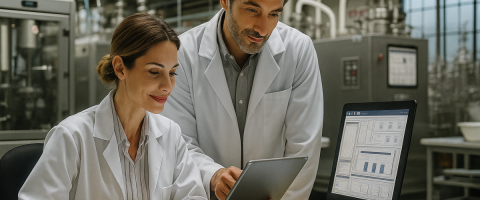A Scope with Rules | Flexible Standards
In business, flexible standards are crucial to respond to dynamic market demands. This involves deriving standards from process workflows that allow both repeatability and adaptability.
Benefits of Standardisation
Standards provide a foundation for consistency and quality. Standards derived from daily process workflows help in safely and efficiently managing important and recurring tasks. This not only eases the workflow but also opens up new advantages, such as the digitalisation and automation of processes. These processes can be completed more successfully with a fraction of the resources previously needed.
For example, in a manufacturing company, regular standardised GMP (Good Manufacturing Practice) tours are conducted. This ensures consistent quality of audits and facilitates the identification and rapid remediation of defects, leading to high process and product safety and ultimately higher customer satisfaction.
Deriving flexible standards from process workflows enables repeatability and adaptability, effectively addressing dynamic market demands and enhancing customer satisfaction.
Flexibility in Process Management
Even though the recurring tasks that organisations need to perform are often the same, there can still be variations. This means that a strictly rigid approach to standardisation might not yield the desired results, as there will always be a certain percentage of processes that do not fit the pre-made form. The ability to react flexibly to exceptional situations is essential for a company's success. This requires process management that is both controlling and adaptable.
In the same manufacturing company, auditors encounter different configurations of production lines, necessitating the assignment of defects to various equipment components in each GMP tour. By scanning the equipment information found on-site, the technical department can immediately initiate targeted actions. The flexibility to adapt the audit process to specific production conditions enables more effective remediation of quality defects and contributes to continuous improvement.
Individual and Rule-Based Adjustment of Workflows





